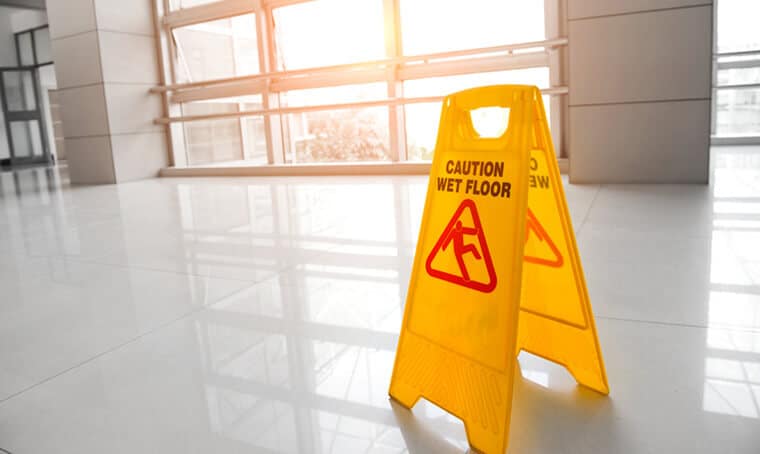HOW LONG DO YOU HAVE TO SUE FOR A SLIP AND FALL?
Slip and fall accidents can happen to anyone regardless of their age. If you’ve been involved in a slip and fall accident, you may be able to make a claim for compensation against the responsible party. However, there are time limits, known as the statute of limitations, to filing a slip and fall claim in Colorado that you should be aware of.
Bachus & Schanker Wins – Over $1 Billion Recovered
- What is a Statute of Limitations?
- What If a Slip and Fall Results in Someone's Death?
- What Is the Statute of Limitations for a Denver Slip and Fall Case?
- What Is the Reason for the Time Limits?
- When Does the Time Start?
- What Are the Other Exceptions to the Statute of Limitations?
- What Happens If You Miss the Deadline?
- How Can a Denver Slip and Fall Lawyer Help With the Time Limits?
- What If I'm Partially at Fault for the Fall?
- What Are My Options If the Statute of Limitations Is Expired in My Case?
- Speak to an Experienced Denver Slip and Fall Lawyer Today
- Visit Our Office Locations Across Colorado & Beyond
- Related Slip And Fall Resources
- You Deserve Fair Compensation
Understanding what Colorado law says about how much time you have to make a slip and fall claim can help you ensure you don’t miss the deadline. Although your Denver slip and fall attorney will be able to give you more specific information about your situation, here’s some helpful information to get you started.https://www.youtube.com/embed/m2ZeRtz8eUU
What is a Statute of Limitations?
A statute of limitations is a legal time limit imposed on the ability to file a claim. The statute of limitations can be different depending on the type of claim, and the state in which the claim is filed.
In Denver, Colorado, the statute of limitations to file a slip and fall accident claim is two years from the date of the accident. Aside from a few specific exceptions, you may not be able to file a slip and fall claim once the statute of limitations has passed.
What If a Slip and Fall Results in Someone’s Death?
If a slip and fall accident results in someone’s death, the family of the victim has the option of filing a wrongful death claim on their behalf.
What Is the Statute of Limitations for a Denver Slip and Fall Case?
The statute of limitations for a slip and fall claim in Colorado is set at two years from the date of the accident.
Colorado Revised Statutes Section 13-80-102 says that any legal actions, including “actions for negligence” has to be instituted “within two years after the cause of action accrues.”
What Is the Reason for the Time Limits?
Legal time limits like the statute of limitations for slip and fall accident claims exist for several different reasons, including:
- Vital case details like physical evidence and witness testimony can fade over time. Time limits are often established to ensure evidence is fresh and preserved.
- The statute of limitations helps to make sure slip and fall accident claims can reach a fair conclusion for both parties in a reasonable time.
When Does the Time Start?
If you’ve been involved in a slip and fall accident that caused any physical injury or property damage, the time limit of two years begins on the date of the accident. More than two years after an accident can be too late to file a slip and fall accident claim.
If an injury that happened because of the accident is discovered later, the time limit begins on the date you discovered the injury instead of on the date the accident occurred. This is called the discovery rule. But if an injury is noticed immediately after a slip and fall event, the two-year time limit begins when the accident occurred.
What Are the Other Exceptions to the Statute of Limitations?
Along with the discovery rule, there are a few other situations where you may still be able to file a claim after the statute of limitations runs out. Colorado law says that a delayed claim can also be valid if:
- The plaintiff/victim is a minor under the age of 18 when the incident occurred. The time limit then starts on their 18th birthday instead.
- The plaintiff/victim was mentally incapacitated or disabled at the time of the incident. The time limit then starts on the date of discovery of the injury.
- The defendant/responsible party is undergoing bankruptcy proceedings. The time limit then starts when the bankruptcy proceedings are finalized.
What Happens If You Miss the Deadline?
If you miss the two year time period, it can affect your ability to make a claim, and you might not be able to sue the responsible party at all. It’s essential to be aware of the time limits to filing a claim to ensure you don’t miss the opportunity to get the compensation you need and deserve.
How Can a Denver Slip and Fall Lawyer Help With the Time Limits?
It’s crucial to start gathering facts and other evidence as soon as possible after the accident. An experienced slip and fall attorney can first help you establish when the statute of limitations started, so you know how much time you have.
They can then get to work gathering the information you need to begin showing how the other party is responsible for your accident. Your attorney will keep track of the time limit for you so that you can focus on your recovery. They will file critical legal documents related to your case, negotiate with the other party or the insurance company, and help ensure you get the maximum compensation for your claim. They can also help you accurately value the damages in your claim.
What If I’m Partially at Fault for the Fall?
Sometimes, more than one person may be responsible for your injuries. There may even be a chance that you contributed to the accident. Even if this is the case, you may still be able to file a claim for compensation.
According to Colorado Revised Statutes Section 13-21-111, you may still be able to make a claim for any damages even if you were partially responsible for the accident. However, your compensation will be reduced by whatever percentage you are found to be responsible for the accident. As long as you are not found to be more than 50 percent responsible, you can still file a negligence claim. Your Denver slip and fall attorney can help you better understand how this applies in your situation.
What Are My Options If the Statute of Limitations Is Expired in My Case?
If the statute of limitations has expired for your case, it’s not always the clear-cut end of your claim.
There are a few exceptions to the law, and an attorney can help you to establish the vital facts surrounding your case to help you better understand if you can make a slip and fall claim.
Speak to an Experienced Denver Slip and Fall Lawyer Today
If you have been injured in a slip and fall accident in Colorado and have questions about the statute of limitations in your case, call Bachus & Schanker, LLC today.
Our skilled legal team can help you understand how time limits apply in your case and help you get the compensation you need to get back to normal. We have represented countless injury victims and are passionate about providing high-quality legal representation to deserving people. We are conveniently located at 5 Colorado locations near you in Denver, Fort Collins, Colorado Springs, Aurora, and Englewood. Our attorneys are ready to serve you and fight for the compensation you deserve. Call us to schedule your free consultation to see how the statute of limitations applies in your slip and fall accident case.
Visit Our Office Locations Across Colorado & Beyond
Serving Clients Nationwide
Related Slip And Fall Resources
You Deserve Fair Compensation
Don’t let the insurance companies intimidate you into accepting less than you deserve. We’re ready to fight for you.

Written and Legally Reviewed By: Kyle Bachus
4.6 ★★★★★ 1,461 Google Reviews
Kyle is a member of the Colorado Bar associations and has served on the Board of Directors of the Colorado Trial Lawyers Association for more than twenty years in total. Over the years, Kyle has achieved justice for many clients. He has served on numerous committees and repeatedly won recognition from his peers at both the state and national level. He is proud of the role he has played in the passage of state and national legislation to protect consumers and is a frequent speaker and guest lecturer.











